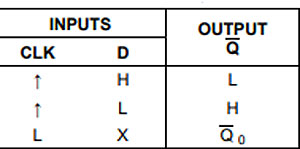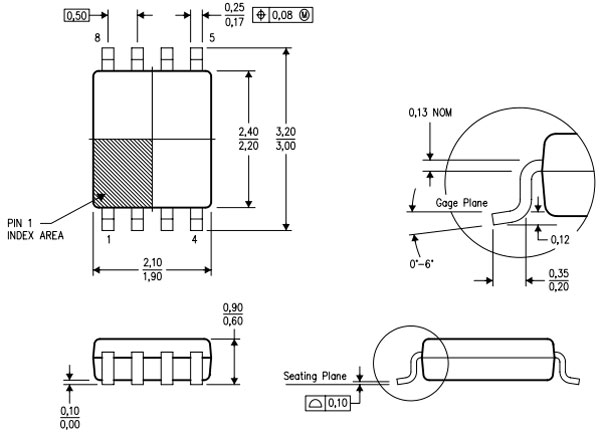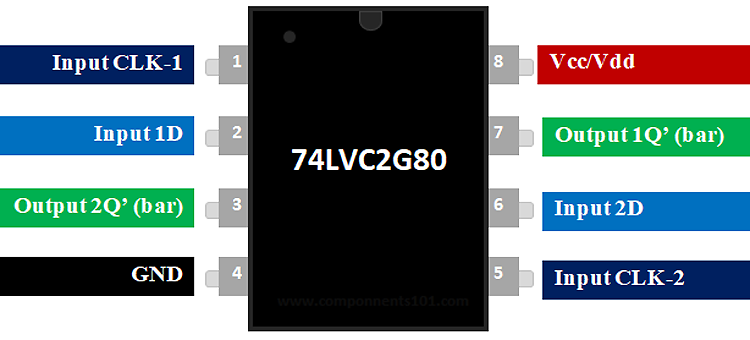74LVC2G80 Positive Edge Triggered D Flip-Flop
74LVC2G80 flip-flop IC is designed for 1.65-V to 5.5-V VCC operation. This IC is fully specified for partial-power-down applications using Ioff. The Ioff circuitry disables the outputs, preventing damaging current backflow through the device when it is powered down.
74LVC2G80 Pinout Description
|
Pin Number |
Pin Symbol |
Name |
Description |
|
3,7 |
1Q’(bar) / 2Q’(bar) |
Complementary Output |
Inverted output pin of Flip Flop |
|
1, 5 |
1CLK / 2CLK |
Clock Input Pin |
These pins must be provided with clock pulse for the flip flop |
|
2,6 |
1D /2D |
Data Input Pin |
Input pin of the Flip Flop |
|
4 |
GND |
Ground |
Connected to the ground of the system |
|
8 |
Vdd/Vcc |
Supply Voltage |
Powers the IC typically with 5V |
Features
- Dual D Flip Flop Package IC
- Operating Voltage: 5V
- Propagation Delay: 4.5nS @ 5V
- Minimum High-Level Input Voltage: 0.7 × VCC
- Maximum Low-Level Input Voltage: 0.3 × VCC
- Operating Temperature: -40 to 125°C
- High-Level Output Current: 32mA
- Current - Quiescent (Iq): 5µA
- Available in the Texas Instruments NanoFree™ Package
Note: Complete technical details can be found in the 74LVC2G80 datasheet given at the end of this page.
Equivalent
Where to use 74LVC2G80 D Flip-Flop?
The 74LVC2G80 is an 8 pin IC from Texas instruments which has two D Flip-Flops inside a single package, it is the modern day replacement for HEF403 D Flip Flop IC. Each of these two Flip-Flops can be used individually based on our application. The flip-flops are also called latching devices meaning it can remember one single bit of data and due to this ability the D-Flip Flops are used in time delay circuits, Sampling circuits and even as buffer circuits.
Normally D flip-flops are used in digital circuits in combination with other Gates or Flip-flips. So if you are looking for an IC for latching purpose or to act as a small programmable memory for your project then this IC might be the right choice for you.
How to use D Flip-Flop?
Using a Flip-Flop is pretty straight forward. To understad the working of 74LVC2G80, simply power the IC using the VCC and GND pin then, as told early each flip-flop operates independently, so just connect the input signal 2 for using the 1st flip-flop and you will get the output at pin 7. The pin 1 should be provided with a clock source normally a PWM signal from an MCU or 555 timers is used. The pin can be used to clear the data and reset the flip flop by making it high. The complete working of the Flip flop can be understood by taking at the function table below. The symbol “X” indicates don’t care and the up-arrow indicates the rising edge of the signal.

Applications
- Used as Shift Registers
- Memory/Control Registers
- Buffer Circuits
- Sampling Circuits
- Latching devices
2D Model and Dimensions
Dimensions for 74LVC2G80 IC is given below. These dimensions are for the PDSO package. If you are using different package IC, please refer to the 74LVC2G80 datasheet.











